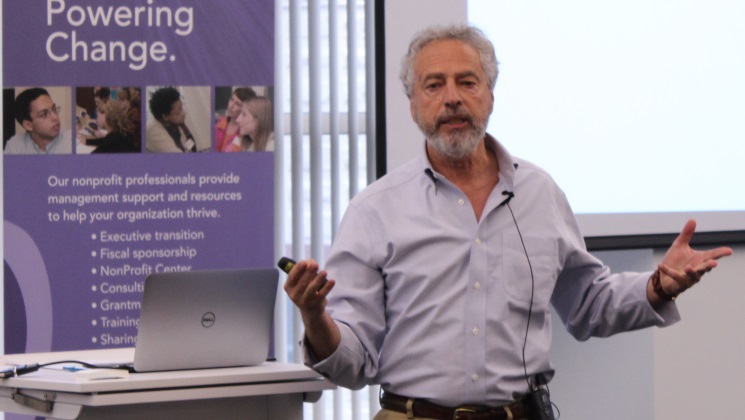“Organizations and social systems do in fact have a life of their own.” David P. Stroh
Patience and resolve are at the heart of David Stroh’s model in his new book Systems Thinking for Social Change. During his recent visit to the NonProfit Center in Boston he called on foundation, donors, boards, leaders of nonprofits, and public policy makers to change the way they think about solving complex social issues from merely maintaining short-term fixes–however well-intentioned–to a system approach that considers the issues as a whole and not just individual parts.
He noted medical essayist and physician Lewis Thomas saying “When you are confronted by any complex systems, such as an urban center, with things about it that you are dissatisfied with and anxious to fix, you cannot just set about fixing with much hope of helping. This is one of the sore discouragements of our time” … “If you want to fix something you are first obliged to understand … the whole system.”
David’s approach to systems thinking focuses on the long-term impacts versus the ‘quick fixes’ and short term approaches that many of us take to solving problems. “This focuses on the symptoms rather than the underlying problems,” says David Stroh. “Although quick fixes can succeed in the short-run, they often come at the cost of undoing long-term impacts and often have unintended negative consequences.”
David told our guests at the Nonprofit Center that every system does exactly what it is set up to do. But understanding the interconnectedness of issues and problems in a system helps you shape that system for your desired purpose. This is best way to apply systems thinking to the task of creating long-term and meaningful social change.
He outlined the differences in more conventional linear thinking and systems thinking. Conventional thinking is useful for simple problems like you have a cut on your hand so you apply a Band-Aid. For complex, social problems like homelessness for example, applying systems thinking requires a sustained commitment and a long-term vision from leaders to reach their highest aspirations.
David said that systems thinking has many implications for funders and policy makers as well as nonprofit organizations and their leaders. The discipline requires that we think about the complex relationship between problems and their causes as indirect, requiring us to think about the complexity of the problem as a whole and improving the relationship among the various parts rather than optimizing a single part of the whole as a quick fix. This way we can see that there are key coordinated changes that, over time, will lead to the desired systems change.
- If you missed our event, you can see a recording of David’s talk: http://www.ustream.tv/recorded/91169693
- Purchase a copy of Systems Thinking for Social Change: http://www.chelseagreen.com/systems-thinking-for-social-change
- Learn more about systems thinking in David’s online course; http://www.iseesystems.com/store/training/systems-thinking-concepts/
